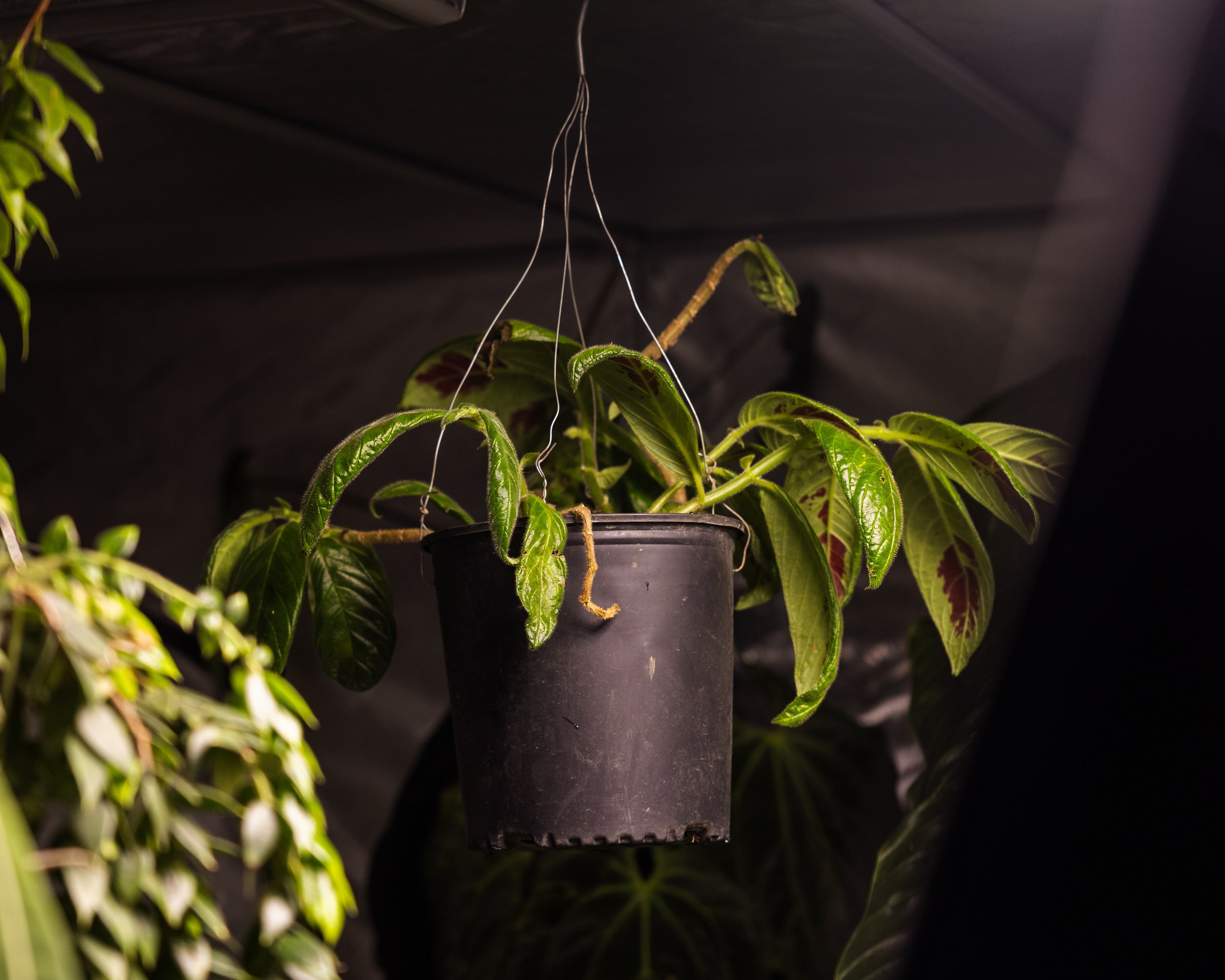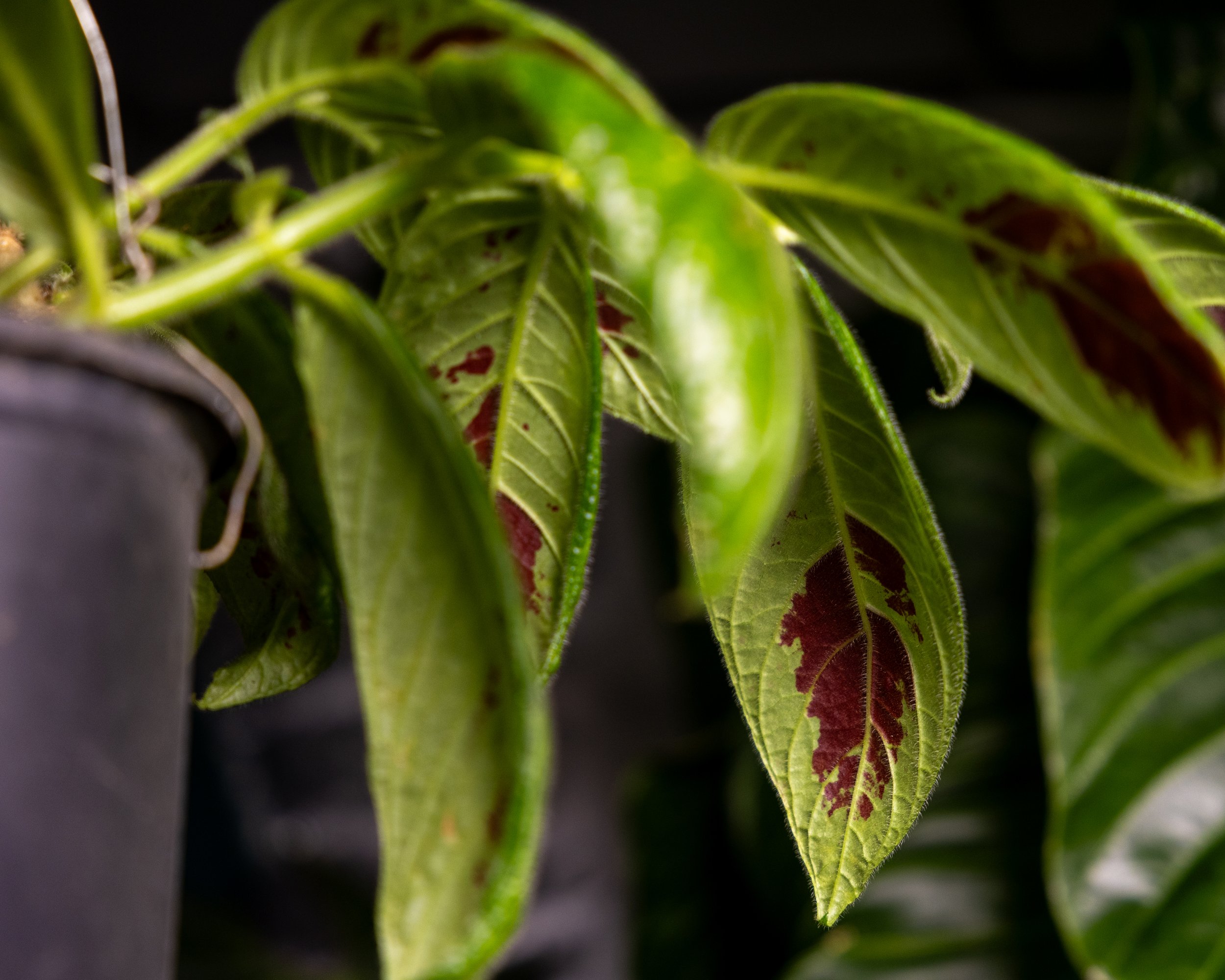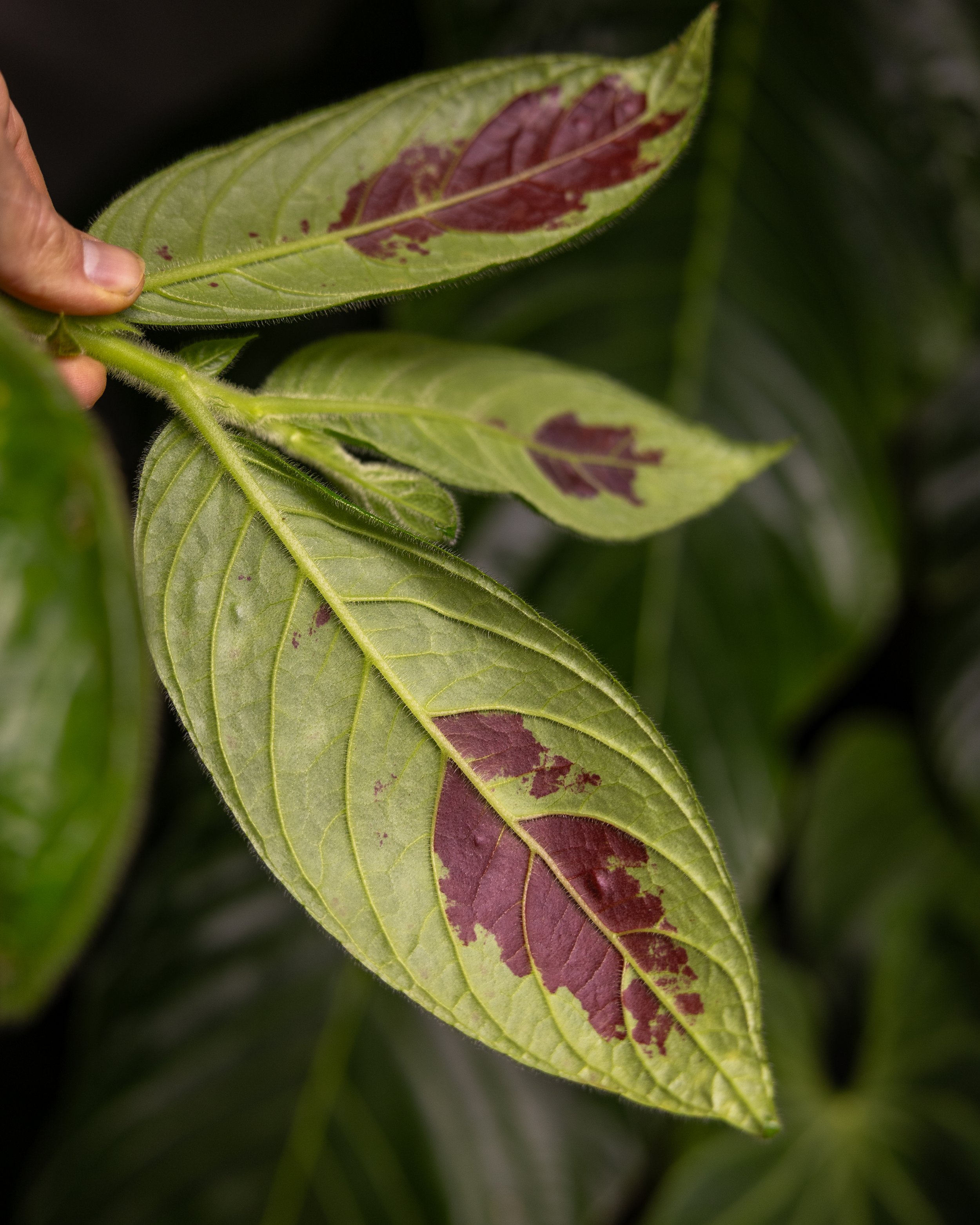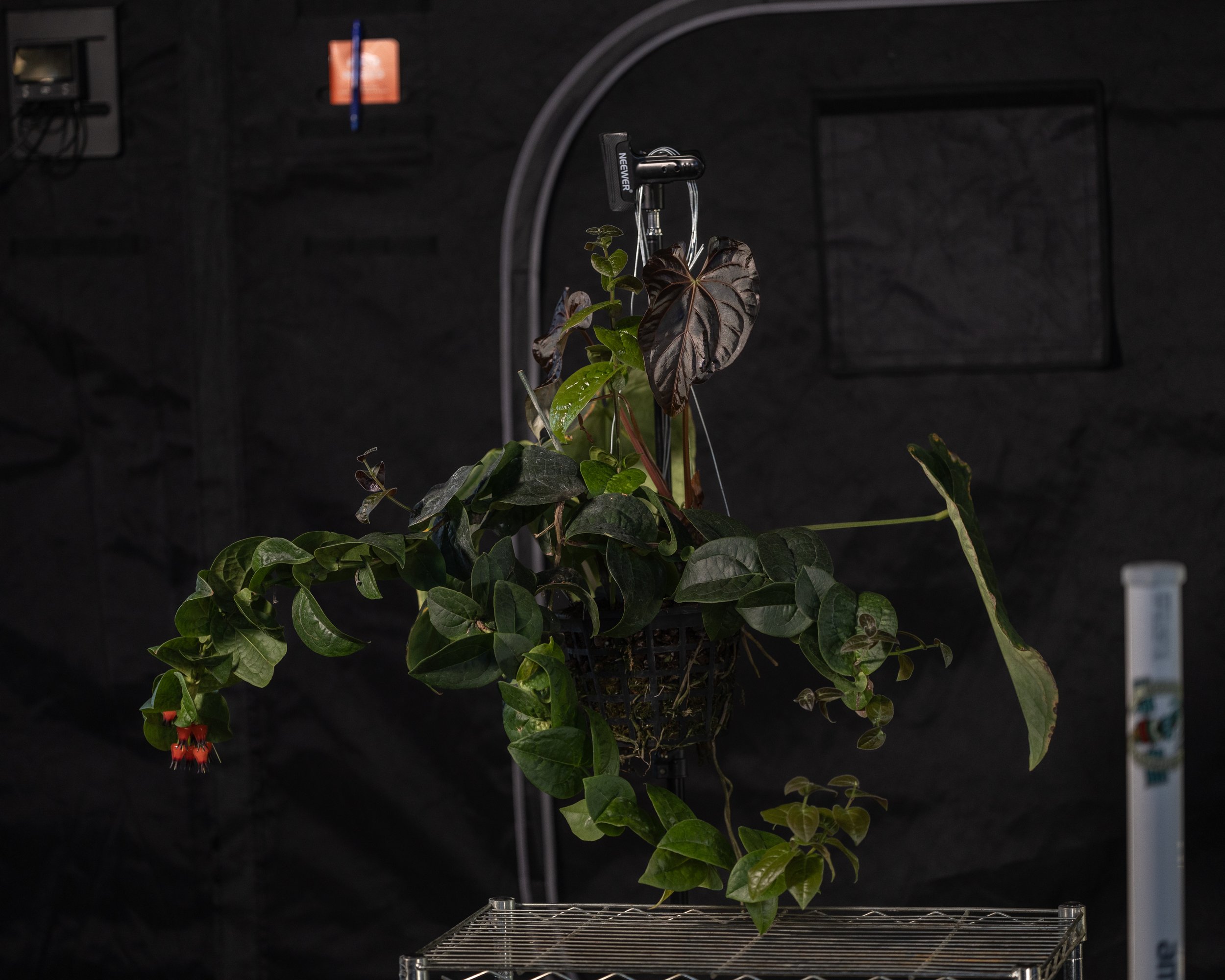The collection.
A work in progress,
compendium of plants grown indoors in my garage.
Anthurium hybrid: luxurians x dressleri Rio Guanche* ecotype ‘Black Magic’ clone B/sib B
acquired in 2020
the name ‘Black Magic’ is trademarked by the breeder whom also stopped selling the props of this clone in 2019, hence why I was only able to get this sibling from the same seed batch: ‘clone B’.
fertile as breeding plant
impressive size with current larges leaf at 22” and holding over a dozen leaves
the RG ecotype dressleri clone was used by Jay Vannini to make this hybrid
care: cool/cloud forest climate
2. Anthurium carlablackiae (Darien Gap), NSE
obtained from NSE Tropicals in 2021
?likely RA clone?
3. Anthurium hybrid: Curandero: papillilaminum ‘Ft. Sherman’ x sp. nov. Rimachii
sp. nov. aff. Rimachii can get 3ft tall and was found growing in standing water. This hybrid is hard to kill.
care: warm
4. Anthurium hybrid: Shaman’s Apprentice: luxurians (Colombia) x papillilaminum (Panama)‘Ft. Sherman’
luxurians as a seed parent makes this one unique
JV hybrid obtianed in 2021
care: warm climate
5. Anthurium magnifucum, Norte, ‘Julie Mag’
acquired in 2018 from a former collector of select Aroids and Orchids in California
species origin: Colombia
care: warm climate
6. Anthurium pallidiflorum, ‘1’
2018, Scott Cohen
care: warm climate
7. Anthurium pallidiflorum ‘Ruff Ryder’
2018, Scott Cohen
over 5k occurrences in nature with a wide range
refuses to die (RIP DMX*)
care: warm climate
8. Anthurium punctatum
Ecuador, cloud forest
obtained from JV in 2021
very rare*.
ascession form material traded at an Australian Aroid conference in the early 90s that did a world tour before making it to my collection.
care: warm climate, needs shade to thrive and lots of high quality water with a rapidly draining substrate. (and I’m willing to throw all that out the window if someone out there has better luck with this species than I do and wants to share what sort of sorcery they’re using.)
9. Chlorospatha kolbii
Colombia/ Choco region. Very few recorded occurrences in nature.
Araceae/Aroid
care: warm climate, needs lots of water and shade to even consider being happy for me.
prone to dormancy if neglected (aka miss a watering and it will faint, but luckily it seems quite hardy as this one has bounced all the way back for me from a tantrum it threw after moving the entire collection.)
When I decided to put ‘Red Velvet’ in a basket with a neoBB in 2022. Now it is one of my favorite features.. see. below.
10. Anthurium regale x dressleri ‘Red Velvet’
A JV cultivar* of Anthurium regale ex-Moyobamaba Waterworks x Anthurium dressleri Rio Guanche ecotype (the OG clone)
smaller but with more vivid emerging leaves than sister plant ‘Voodoo Child’
acquired in 2021
care: warm
currently lives in a basket with my favorite NeoBB: C. amplexicaule; larger accommodations or a separation is eminent though as this plant matures taking on more regale traits.
‘Red Velvet’ and C. amplexicaul hanging basket in January 2025
11. Anthurium marmoratum x rugulosum “Quechua Queen”
marmoratum “JW x self” x rugulosum ‘Lago Agrio rd’
gets over 5’ tall
Care: cool
12. Anthurium dressleri x rugulosum “Carib Queen”
(F1)dressleri RG x rugulosum
care: cool
Carib Queen in the Garage
Above are some plants that are growing here now in 2025 back in 2021.
13. Anthurium leuconeurum-
(F1) seed grown from Jay Vannini
Both parent plants from the Chiapan highlands of Mexico.
care: cool
Anthurium Zara x Michelle
14. Anthurium “Zara x Michelle”
created by Dr. Block
obtained in 2022
this is ‘Clone 1’
care: warm- very easy to grow
15. Anthurium rugulosum
(F1) seed grown
care: warm
16. Anthurium cerrobaulense
‘Tzetzal Lance’ x self
This species is endemic to the Arriaga and Cintalapa municipalities in the southeastern Oaxaca region of Mexico where it grows as both a lithophyte and epiphyte.
Anthurium cerrobaulense ‘Tzetzal Lance’ x self
this pebbled leaf Aroid is grown in my Garage Tropics in NC.
Anthurium rugulosom
Dagger man.
17. Anthurium papillilaminum ‘RL’ x ‘FS’
care: warm climate
ex-JV 2021
was one of the “dagger”* seedlings featured in the Velvet Leaf article by Mr. Vannini.
18. Anthurium antolakii ‘Round’ x ‘Felix’
bred by Grant and Justin 2022
was a “personal keeper” selected for me as the export game was crazy back then
care: warm
Anthurium antolakii ‘Round’ x ‘Felix’
19- Anthurium hybrid (luxurians x dressleri) x carlablackiae Morticia’s Magic
ex-JV 2023
care - stays in a humidity dome
if you haven’t seen the ‘Morticia Addams’ clone of carlablackiae go see it in JV’s velvet leaf article… since he wouldn't sell me that I had to have the first hybrid made using it… a little Rio Guanche dressleri from ‘Black Magic’ never hurts either.
did not like the recent move



20. Columnea sanguinea
found from Panama to Brazil and on up Dominican Republic
can get massive, reported in nature 6ft tall
terms:
1- Rio Guanche- River region this clone was discovered
2- clone- refers to “plants” with shared root stock. Stem props, offsets, etc.
3- DMX (1970-2021) was an avid orchid grower, poet, actor, and founded an ATV enthusiast group named the “Ruff Ryders”.
4- cultivar- as used in this article will be used to differentiate from hybrids as these are individual plants that were selected for specific traits, propped, then grown on into a stud colony.
5- “Dagger”- a leaf morphology selected for
























